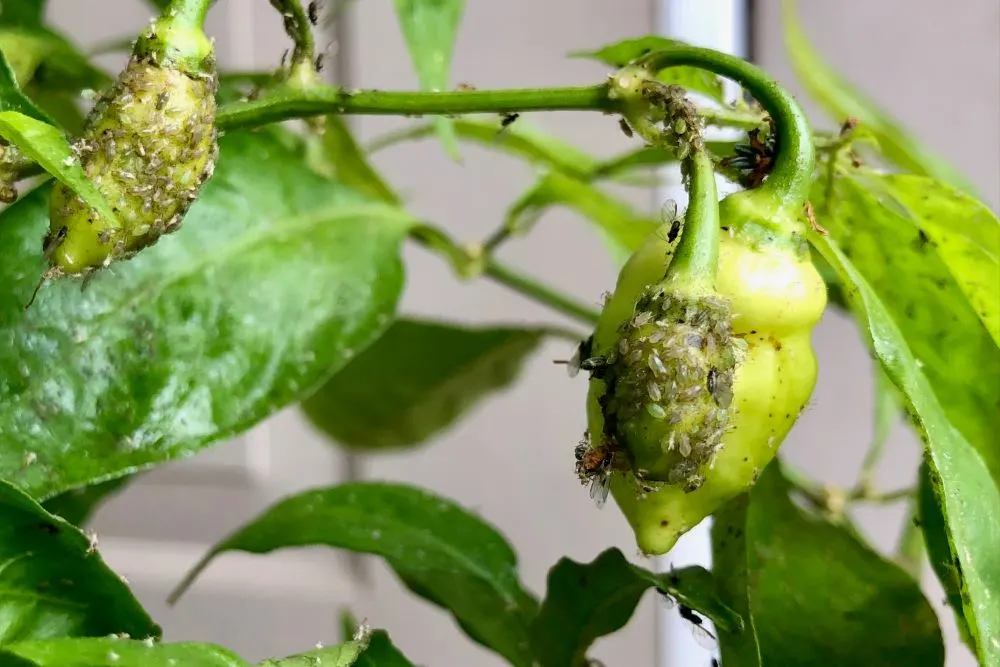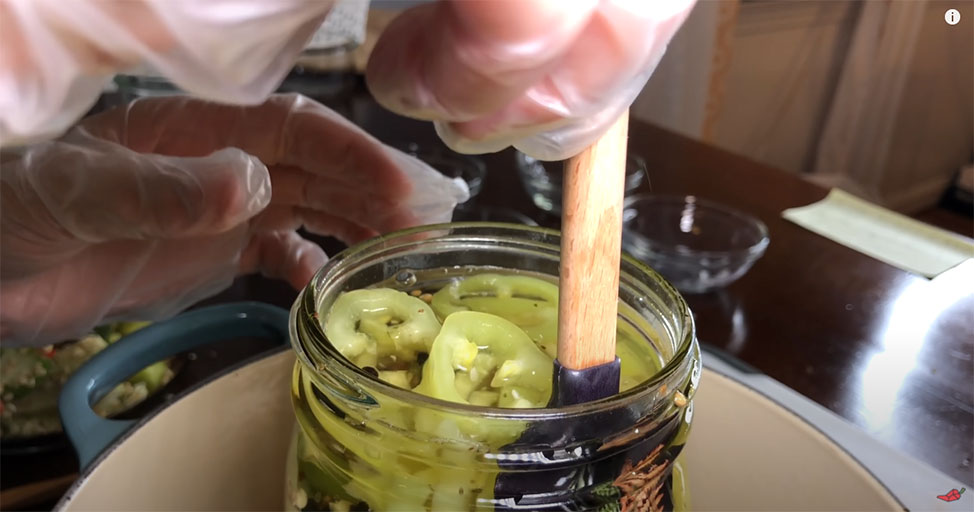Aphids are a common bug that can really hurt pepper plants. These tiny bugs that feed on plant sap attack pepper plants’ leaves, stems, flowers, and fruit, slowing their growth and lowering their yields. Chemical insecticides can get rid of aphids, but many gardeners prefer natural methods that are safe for people, pets, and good bugs. There are a number of eco-friendly ways to get rid of aphids on pepper plants, which is good news.
What Do Aphids Look Like?
These are aphids, which are small, soft-bodied bugs that can be green, yellow, brown, red, or black. The bodies of most species are shaped like pears, and their legs and antennae are long. They may be winged or wingless. On the undersides of leaves or on stems, aphids often gather in big groups.
Signs of an aphid infestation include:
- Curled, deformed and yellowing leaves
- Sticky honeydew residue on leaves and stems
- Stunted plant growth
Checking the undersides of leaves often is the best way to find aphids early on, before they get out of hand.
Natural Ways to Control Aphids
If you find aphids on your pepper plants, here are some effective natural remedies:
1. Blast Them Off With Water
A strong spray from the garden hose is often enough to get aphids off of stems and leaves. Pay attention to the aphids that hide on the undersides of leaves and in cracks in stems. Light infestations can be kept under control by doing this two to three times a week.
2. Apply Insecticidal Soap
Insecticidal soaps made from potassium salts of fatty acids kill aphids on contact by dissolving their exoskeletons. Look for commercial products or make your own by mixing 2 1⁄2 tablespoons of insecticidal soap with 1 gallon of water. Spray liberally on infested plants every 5-7 days until aphids are gone. Avoid applying in extreme heat.
3. Use Neem Oil
Extracted from the seeds of the neem tree, neem oil interrupts the life cycle of insects. It’s most effective against young, developing aphids. Mix according to label directions and spray plants, including the undersides of leaves. Apply weekly for 2-3 weeks. Always test on a few leaves first as neem oil can burn some plants.
4. Apply Diatomaceous Earth
The microscopic, razor-sharp particles of diatomaceous earth (DE) damage the waxy coating on insect exoskeletons, causing dehydration and death. Dust leaves, stems and soil around pepper plants with food-grade DE. Reapply after rain or watering. Avoid breathing in DE dust.
5. Encourage Natural Predators
Ladybugs, lacewings, hoverflies, predatory wasps and many species of birds eat aphids. Attract these beneficial insects by planting nectar-rich flowers like daisies, asters and mint nearby. You can also buy live ladybugs to release.
6. Use Reflective Mulch
Silver-colored plastic mulch repels aphids and other pests while blocking weeds. Spread reflective mulch around pepper plants, leaving holes for plants to grow through. The reflected light confuses insects.
7. Apply a Strong Water Spray
A simple strong spray of water can help wash away aphid populations. Focus on the undersides of leaves and stems where they hide. It’s best to do this early in the day so the foliage has time to dry out.
8. Wipe Them Away
For small infestations, dip a cotton swab in alcohol and use it to manually wipe aphids off leaves and stems. Check the undersides of leaves carefully. Destroy the cotton swab after use so aphids don’t spread.
9. Remove Heavily Infested Growth
If aphids are concentrated on a few leaves or stems, simply prune those parts off. Remove and destroy the infested trimmings – don’t compost them. This can slow the spread of the infestation.
10. Apply a Garlic-Chili Spray
Aphids dislike the strong smell of garlic and capsaicin in chili peppers. Steep 3-4 crushed garlic cloves and small hot chili pepper in 2 cups of hot water for 24 hours. Strain and mix the liquid with 2 tbsp neem oil and 1 tsp dish soap. Add to 1 gallon of water and spray onto plants.
11. Use Companion Plantings
Planting onions, garlic, chives, petunias, marigolds and nasturtiums near peppers can help repel aphids. Their strong scents mask the smell of the peppers.
12. Avoid Excess Nitrogen
Too much nitrogen fertilizer results in fast, tender growth that attracts aphids. Go easy on high-nitrogen fertilizers and instead use compost and organic matter to enrich the soil. This results in slower, steady growth.
Prevent Aphids from Returning
While getting rid of existing aphids is important, prevention is ideal to avoid repeated infestations:
-
Check transplants carefully for signs of aphids before planting.
-
Use row covers early in the season to form a barrier against aphids.
-
Control ant populations – they farm and protect aphids.
-
Remove crop debris after harvest to eliminate overwintering sites.
-
Rotate pepper crops to different areas of the garden each year.
-
Plant nectar-rich flowers to attract beneficial insects that eat aphids.
-
Apply neem oil or insecticidal soap early in the season before aphids arrive.
-
Use reflective mulch early in the season to deter pests.
-
Grow resistant pepper varieties like Serrano, Anaheim, Ancho and Hungarian Wax.
With diligent monitoring and a combination of these organic, non-toxic remedies, you can keep ahead of aphids and protect your pepper crop. Focus on prevention first, then take swift action at the first signs of an infestation. With an eco-friendly pest management plan, your peppers will thrive aphid-free.

Step 5: Pour your brine over the peppers
The smoothest way to do this is by using a funnel. I would also recommend putting your jar of peppers on a pan or in a large bowl. This will make it easier to clean up if there is any spillage. At this point, you can pour your hot brine into the jar over your banana peppers. Make sure all the spices get in there too! You may have a bit of brine leftover which you can discard.

Use a spatula to go around the edge and remove the air bubbles.
How To Pickle Banana Peppers
We also have an easy-to-follow video tutorial on pickling banana peppers on YouTube. Here is our basic procedure for quick pickled banana peppers.
How to Get Rid of Aphids on Pepper Plants – Aphid Control in the Garden
FAQ
What is the best homemade aphid killer?
Dish Soap Mix – Just mix up a cup of vegetable oil or a pint of water with two teaspoons of dish soap. Then spray it right on the bugs. May 23, 2023.
How do I get rid of aphids permanently naturally?
Soapy water. 1 tsp. of liquid soap in a gallon of water, spray it on the aphids, it will wash many off of the plant and it will kill all of the aphids it gets on. It is mild enough to not hurt the plants.
Does vinegar kill aphids naturally?
Make a vinegar spray: A vinegar spray can also be effective against aphids. Mix equal vinegar and water in a spray bottle, then spray the aphid-infested plants. Be careful with vinegar because it can harm plants if there is too much!.
